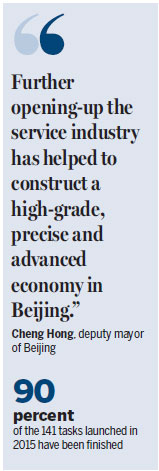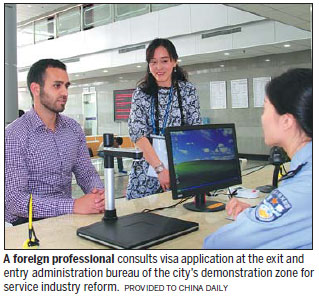Further opening-up and more efficient regulation to support metropolis' role as national center
Innovation in Beijing's service industry is attracting more professionals from around the world to join in the effort to construct an inclusive, advanced and internationalized capital.
The city released 141 reform tasks in 2015 when approved to be China's first demonstration zone for further opening-up the service industry, focusing on six fields, including scientific technology, finance, the internet and information, and medical health.
Two years later, 90 percent of the tasks were finished, far sooner than expected, said Cheng Hong, deputy mayor of Beijing, at the second anniversary of the capital's opening-up service program held on Thursday.
"Further opening-up the service industry has helped to construct a high-grade, precise and advanced economy in Beijing," she said.
The two service halls in Chaoyang and Shunyi districts launched 10 preferential policies. All favorable polices in the two districts and Zhongguancun, a demonstrative zone for innovation and high-tech industries in Bejing, target more than 80 percent of the city's foreign population.
Professionals in business, the airport economy, technological services and other industries are finding it easier to apply for permanent residency, thanks to a simplified approval process that reduces the processing time by half, down to 90 working days, according to Zhao Hui, an official at Beijing Municipal Commission of Commerce.
Chances for internships and entrepreneurial ventures have also become more accessible for foreign students, he said.

Wu Weijun, partner of the Beijing branch of PricewaterhouseCoopers, said these policies have helped to attract more youth from all over the world, supporting the development of the technology, finance and education industries in Beijing.
Since 2015, Beijing has received 1,204 applications of permanent residence. The number is similar to that from 2004 to 2014, according to the news conference.
Cheng said at the conference that the service industry contributed 80.3 percent of the city's gross domestic product last year, demonstrating the service-based economic structure of the city.
Actual utilization of foreign capital in the service industry grew by 55.4 percent to $12.32 billion in 2016 from 2014.
Total exports and imports in service trading increased by 63 percent during the same period, she said.
Among them, the city's trade in cross-border services comprised significant portions of the national industries' totals: the city's cross-border trade in telecommunications represented 70.4 percent of the national total, insurance 62.4 percent, law 45.8 percent and finance 40.3 percent.
To optimize regulation of foreign investment, the local government has established a database for different official departments to upload and share information of foreign enterprises' good and poor behaviors.
Companies with good credit will be given more convenient services, Zhao, from the Beijing Municipal Commission of Commerce said.
Since launching in October 2016, the database has collected about 36,000 pieces of information, including about 20,000 good reports, he said.
Inter-department cooperation has been established to better serve foreign investors, who now only need to visit the office once to have all the necessary processes completed, which has cut repetitive processes among different departments by 45 percent, said Zhao.
Online customs clearance and quarantine platforms, as well as duty-free warehouses have been established to streamline global logistics and boost cross-border e-commerce.
Actions generating results
Air France-KLM Group launched its Beijing-based airport maintenance joint venture with BAIC Group in February.
The multinational company is the first of its kind in China with a foreign majority shareholder.
Global giants, including the United States-based Apple, new energy car manufacturer Tesla and healthcare company Merck Sharp & Dohme, have all established research centers in Beijing.
According to the official document covering the deepening reform of the service industry released this month, the city will allow foreign investors to engage in fields such as air transport, audio and video production as well as the management of entertainment venues.
In the commerce and tourism industry, Chinese law firms are encouraged to cooperate with foreign partners.
There will be fewer restrictions on foreign recuitment agencies and investment companies settling in Beijing.
"We expect the further opening-up of the service industry to strengthen the capital's position as the national political, cultural, global communication and technological innovation center," said Cheng.
"The structural reform of supply side sectors will play an important role in constructing a freer service industry market. More interdepartmental cooperation will be established to improve efficiency."
The integrated development of the Beijing-Tianjin-Hebei region and the construction of Xiongan New Area will also be a focus in order to realize sustainable economy throughout the region, Cheng added.
chenmeiling@chinadaily.com.cn
|
A visitor uses an app to operate a robot at the Beijing International Fair for Trade in Services last year.Zhang Chenlin / Xinhua |

(China Daily 07/28/2017 page10)